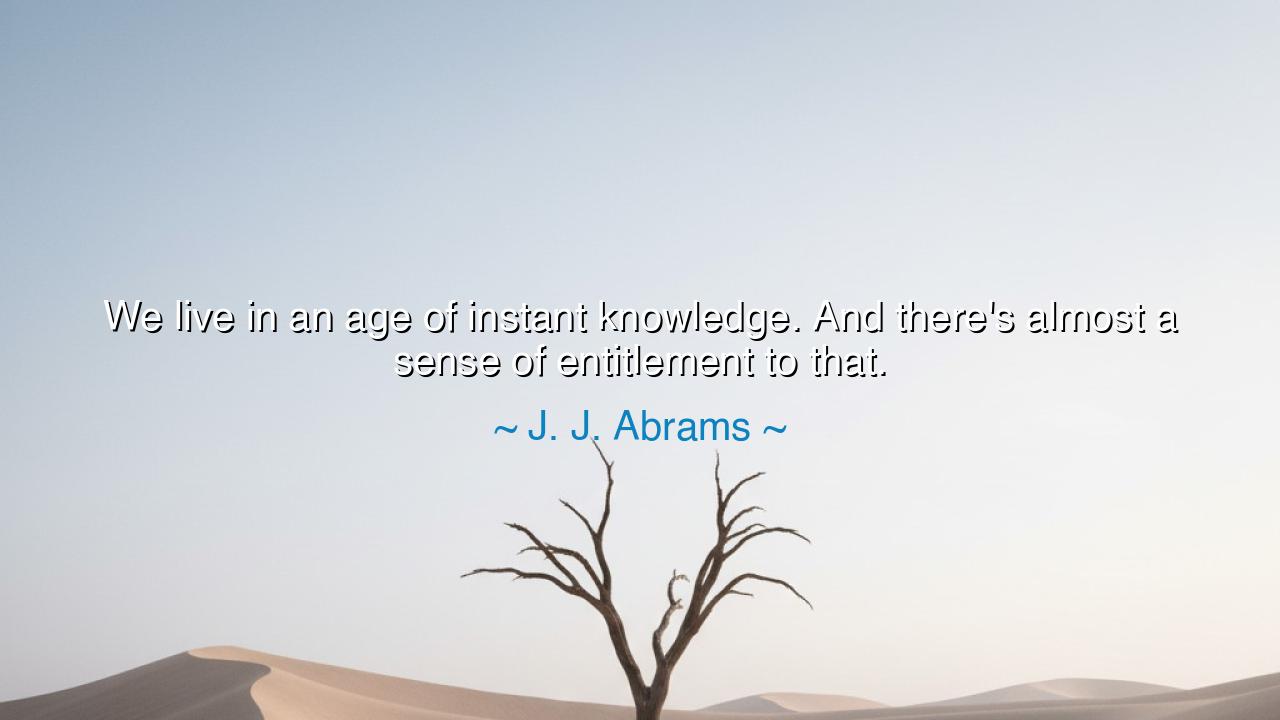
We live in an age of instant knowledge. And there's almost a
We live in an age of instant knowledge. And there's almost a sense of entitlement to that.






The visionary storyteller J. J. Abrams, a craftsman of mystery and imagination, once observed: “We live in an age of instant knowledge. And there’s almost a sense of entitlement to that.” In these words lies both awe and lament — the wonder of a world that can summon any fact with a touch, and the sorrow of a generation that mistakes information for wisdom. His reflection is not an accusation, but a plea — a reminder that while knowledge has become instantaneous, understanding still requires patience, humility, and reflection. For though our devices can answer every question, they cannot teach us how to ask the right ones.
The origin of this quote springs from Abrams’ musings on storytelling in the digital age. As a creator of films that thrive on mystery — stories like Lost and Star Wars: The Force Awakens — he has often spoken about the beauty of not knowing, of discovery through wonder rather than immediacy. In the modern world, where every secret can be revealed by a search engine and every ending spoiled before it arrives, Abrams warns that we are losing something sacred: the journey of curiosity. The age of instant knowledge has granted humanity power beyond imagination, yet in that same gift, it has sown the seeds of impatience and entitlement — the belief that every mystery owes us its truth immediately.
To the ancients, knowledge was not instant — it was earned. The philosopher walked miles to find a teacher; the disciple spent decades in study to glimpse a fragment of truth. Knowledge was sacred because it required effort, discipline, and devotion. But now, says Abrams, we stand in an age where the vaults of human wisdom open with a click. The mystery of learning has been replaced with the illusion of mastery. We know everything, yet we understand so little. We gather facts like shells on a shore but forget to listen to the ocean of meaning beneath them.
Consider the story of Socrates, who lived long before the internet, long before printed books, yet remains one of the wisest men in history. When told he was the wisest of all, Socrates replied that his only wisdom was in knowing that he knew nothing. In an age where the young and the old alike can claim omniscience through a device in their hand, the humility of Socrates is nearly lost. Abrams’ warning echoes the philosopher’s lesson: that true wisdom begins in wonder, not in certainty; in curiosity, not in convenience. For the one who believes he already knows ceases to seek — and in ceasing to seek, he ceases to grow.
The meaning of Abrams’ words reaches beyond technology — it touches the soul of our civilization. When knowledge is instant, patience perishes. We no longer allow ideas to ripen; we pluck them before they have borne fruit. We crave answers more than understanding, results more than revelation. We have become impatient with mystery, yet mystery is the soil in which wisdom grows. To demand truth without effort is to rob ourselves of the joy of discovery — the sacred moment when knowledge is not just known, but felt.
There is a paradox at the heart of this age: we have gained the libraries of the world, yet we have lost the art of contemplation. The ancients meditated upon a single verse, a single question, for years. They turned it over like a gem in the light, learning its hidden facets. Today, we consume knowledge like fast food — quick, satisfying, but without nourishment. The entitlement Abrams speaks of is not arrogance alone; it is a quiet tragedy — the loss of reverence for the very thing that makes us human: the slow unfolding of understanding.
The lesson is clear: do not confuse access with mastery, nor speed with insight. Learn to cherish the process of learning itself. When you seek knowledge, do so not merely to possess it, but to be transformed by it. Let questions linger; let curiosity breathe. Cultivate humility before the vastness of what you do not yet know. For the one who hurries to know everything ends up knowing nothing well. The one who waits, studies, reflects, and wonders — that soul becomes luminous with wisdom.
Thus remember, O seeker of truth, that the miracle of this age is not the abundance of knowledge, but the opportunity to use it wisely. Let the flood of information not drown your spirit; let it awaken discernment. Do not demand that every secret be revealed at once — for even in an age of instant knowledge, the universe still whispers its truths slowly, to those who have the patience to listen. And in that listening — in that reverent slowness — you will find not just answers, but understanding, not just facts, but the eternal wisdom that outlives the age of machines.






AAdministratorAdministrator
Welcome, honored guests. Please leave a comment, we will respond soon